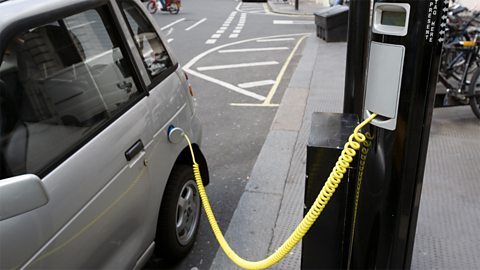Energy efficiency

An electric car charging
With energy consumption rising it is important that industry, transportation and consumers in their homes use energy more efficiently so that less is wasted.
This will also save money on fuel bills. We can all help by making changes to our lifestyles and our houses, for example by:
- Walking, cycling, or using public transport rather than fossil-fuel powered cars
- Reducing the number of aircraft journeys taken (especially short-haul flights)
- Using smaller, more energy-efficient cars or electric cars
- Switching off lights, power sockets, phone chargers and TVs when not in use
- Reducing use of plastics and oil-based products. Recycling and reusing the products we do use
- Using energy-efficient light bulbs and rechargeable batteries
- Insulating house roofs and walls, blocking draughts and using double-glazing and energy-efficient heating systems
- Considering installing solar panels or switching to an electricity supplier that supplies green electricity
Question
Describe global and local strategies to manage the impact of climate change.
Global
- Scientists observe and measure changes in temperature, CO2 emissions and rising sea levels to monitor the rate of climate change and advise world leaders
- Countries switch from fossil fuels to alternative sources of energy e.g. solar power or biofuels to reduce the amount of CO2 in the atmosphere
- Industries expand renewable energy sources such as wind, wave and solar power.
- World summits allow politicians to get together and discuss global strategies to try to reduce their use of carbon-based fossil fuels
- Many governments signed the Paris Agreement, committing them to reducing greenhouse gas emissions
- The UN climate summit 2014 enabled world leaders to agree actions intended to avert the worst effects of climate change
- Governments ban the use of harmful substances e.g. CFCs to protect the ozone layer
Local
- Industries and domestic users of energy are encouraged to use it more efficiently through media awareness campaigns
- Bus lanes and cycle lanes designated on roads to encourage people not to use their car. This reduces the amount of pollution from exhaust fumes
- London Congestion Charge: drivers pay for driving in the Congestion Charge Zone in order to cut pollution generated from exhaust fumes
- Reduce, reuse or recycle. UK and devolved governments now levy a charge for every plastic carrier bag (10p per bag in Scotland and England, 5p in Northern Ireland and Wales
- Local councils supply bins to help householders recycle various products
- Use energy-efficient light bulbs and rechargeable batteries to conserve energy
- Install solar panels on house roof to generate renewable energy